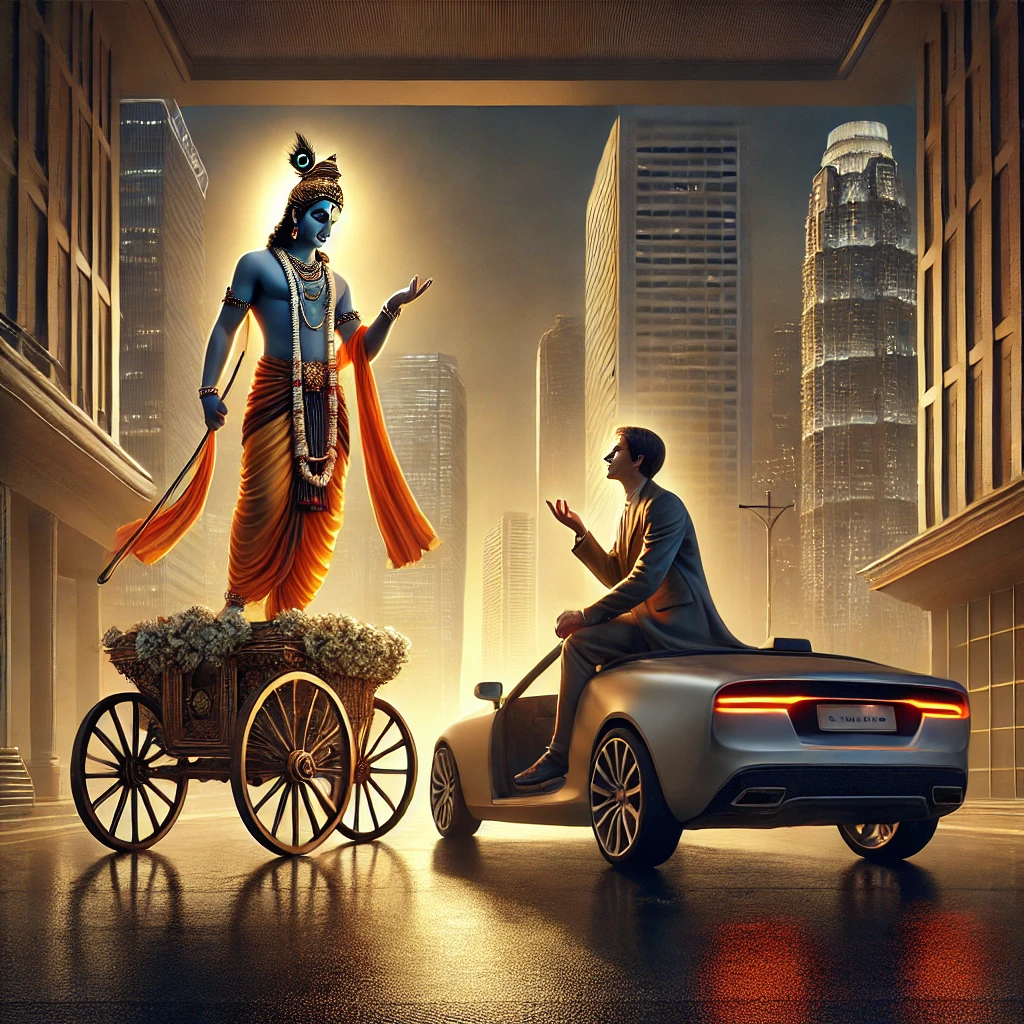We’ve all been there, haven’t we? Staring at a crossroad in life, paralyzed by doubt, unsure which path to take. Sometimes, the weight of our decisions feels so overwhelming that it’s easier to just sit down and not decide at all. That’s where Arjuna was—right in the middle of the battlefield of Kurukshetra, literally and figuratively.
When I first read the Bhagavad Gita, I was struck by how relatable Arjuna’s crisis felt. Sure, he’s a warrior tasked with leading his family into a war that will define the fate of a kingdom. But strip away the context, and you find a human being facing a moral and emotional meltdown, questioning everything—his purpose, his relationships, and even the meaning of life itself. Sound familiar?
Let’s walk through Arjuna’s journey together and see how his doubts weren’t a weakness but the very doorway to his spiritual awakening.
Contents of the Article
The Paralysis of Doubt
Picture this: Arjuna is standing on his chariot, bow in hand, surveying the battlefield. On one side, his teachers, cousins, and elders—people he loves and respects. On the other, his brothers, his allies, his duty as a warrior. The stakes couldn’t be higher.
And then, he freezes.
He throws down his bow, overwhelmed by a wave of emotions: guilt, fear, confusion. He doesn’t want to fight. He doesn’t want to win if it means destroying his family. And in that moment, he questions everything:
- What is the point of this war?
- Is this my dharma?
- What happens to the soul after death?
- What even is the purpose of life?
I’ve had my own Kurukshetra moments—maybe not as dramatic, but paralyzing in their own way. Decisions about career changes, relationships, or even standing up for what I believe in. The doubts creep in, and suddenly, the mind becomes a battlefield.
Arjuna’s crisis isn’t just about the war; it’s about the universal human struggle with doubt. But here’s the beautiful part: instead of running from his doubts, he confronts them.
Turning to Krishna
In his moment of despair, Arjuna does something remarkable: he asks for help. He turns to Krishna, his charioteer and closest friend, and says:
“I am confused about my duty and am overcome by weakness. I am your disciple. Please instruct me.”
That humility, that willingness to admit he doesn’t have all the answers, is the turning point. And honestly, it’s one of the hardest things to do, isn’t it? To say, “I don’t know”?
I remember struggling with a major decision a few years ago. I kept spinning my wheels, trying to figure it all out on my own. It wasn’t until I opened up to someone I trusted—admitting my fears and confusion—that things started to become clear. Arjuna’s surrender to Krishna is a reminder that seeking guidance isn’t a sign of weakness; it’s a step toward clarity.
Doubt as a Catalyst for Growth
Krishna doesn’t dismiss Arjuna’s doubts or tell him to “just get over it.” Instead, He engages with them, answering each question with profound wisdom.
He talks about the eternal nature of the soul, the impermanence of the material world, and the importance of doing one’s duty without attachment to the results. He doesn’t sugarcoat the reality of life’s challenges but offers a perspective that transforms Arjuna’s despair into determination.
Krishna essentially says, “Your doubts are valid. But let’s look at them through a higher lens.”
Isn’t that what growth is all about? Doubt, when approached with the right mindset, isn’t a roadblock—it’s a stepping stone. It forces us to ask deeper questions, to challenge our assumptions, and ultimately, to grow.
Action Without Attachment
One of the most liberating teachings Krishna gives Arjuna is the idea of acting without attachment to the results.
“You have a right to perform your duty, but not to the fruits of your actions.”
This hit me like a ton of bricks when I first read it. How often do we tie our happiness, self-worth, or even our identity to the outcomes of our actions? Whether it’s a job interview, a creative project, or even a relationship, we’re so focused on “winning” that we forget to enjoy the process.
Krishna’s advice is simple but revolutionary: focus on the action itself. Do your best, guided by your values and principles, and let go of the rest.
For Arjuna, this means stepping onto the battlefield not with hatred or greed, but with a sense of duty. For us, it could mean writing a book without obsessing over its sales, starting a business without fearing failure, or even helping someone without expecting gratitude.
Doubt to Devotion
By the end of the Gita, Arjuna hasn’t just found answers—he’s found faith. His doubts have transformed into devotion, not just to Krishna but to his own higher purpose. He stands up, picks up his bow, and steps into the battle—not because he’s free from fear, but because he’s free from confusion.
This, to me, is the heart of the Gita: doubt isn’t the enemy. It’s the beginning of a journey. It’s the spark that leads us to question, to seek, and ultimately, to grow closer to the divine.
What Arjuna’s Journey Teaches Us
If there’s one thing I’ve learned from Arjuna’s story, it’s this: doubts are inevitable. They’re a natural part of being human. But it’s what we do with those doubts that defines us. Do we let them paralyze us, or do we use them as a bridge to something greater?
Here are a few takeaways that have stayed with me:
- Admit when you’re struggling. Arjuna’s willingness to seek guidance is a reminder that we don’t have to face life’s challenges alone.
- Ask deeper questions. Doubt is an opportunity to go beyond surface-level thinking and connect with our true purpose.
- Focus on the journey, not the destination. Acting without attachment is a practice, but it’s one that leads to freedom.
Your Kurukshetra Moment
As you read this, think about your own Kurukshetra moment. Is there a decision, a doubt, or a struggle that’s weighing on you? Maybe it’s time to do what Arjuna did: pause, reflect, and seek wisdom—whether through scripture, a trusted guide, or your own inner intuition.
And remember, doubt isn’t something to fear. It’s a sign that you’re thinking, questioning, and growing. Like Arjuna, your doubts might just be the beginning of your greatest transformation.
So, what’s your next step? Will you let doubt hold you back, or will you let it lead you forward?
Let’s walk this journey together. I’d love to hear your thoughts or experiences—drop a comment or share your story. After all, we’re all on this battlefield of life, trying to find our way.




